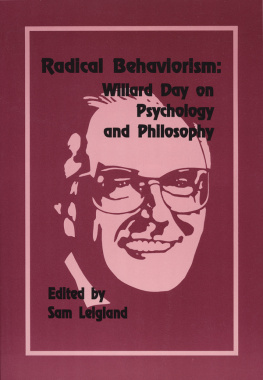Chapter 13
Ethical Philosophy and the Thought of B. F. Skinner
It seems to me that there is significant philosophy in the work of B. F. Skinner in the following sense of the term philosophy. Often in the history of philosophy there have been great thinkers whose work is of such breadth of scope and originality of perspective that it becomes incorporated within the field of philosophy, even though it does not conform to the scholarly practices which constitute academic philosophy at any given period of time. Even though the intellectual character of the most original and innovative aspects of Skinners thought is only now beginning to be accurately articulated within the contemporary philosophical verbal community, it is clear that Skinners work has not been constructed to fit in neatly with the highly refined set of discriminative practices which characterize current academic philosophy in the English-speaking world. Thus what is philosophically interesting and significant in Skinners work can often come across as spotty, incomplete, inadequately argued, or even internally contradictory when the discriminative practices of the professional philosophical community are brought to bear upon it. This is the situation we face in attempting to assess relations between Skinners thought and the history of ethical philosophy.
I think it is important to make it clear at this point that I am not trained in ethical philosophy. Yet in what follows I will have to talk about relations between Skinners thought and developments within professional philosophy that have become increasingly of interest over the past 25 years. Consequently, to make matters somewhat easier on all of us, I will restrict my discussion of ethical philosophy in what follows to the perspective on the history of ethics that is developed in the roughly 25,000-word article on that topic by Abelson and Nielsen in the contemporary Encyclopedia of Philosophy, edited by Paul Edwards. Since this encyclopedia was published in 1967, this means that I will not deal at all with developments in ethical philosophy which have occurred since that year.
Ethical philosophy may properly be said to have begun with Socrates, and in posing the problem of finding rational grounds fully adequate to the justification of ethical judgments, Socrates set the stage for most of the sophisticated discussion of ethical issues that has come after him in the Western world. Immediately following Socrates, sociological and historical factors led to an institutionalization of academic philosophy as an intellectual discipline, so that the Socratic interest in the rational justification of values was fixed at the heart of what was to become traditional ethical philosophy. Almost at once further rigid structure was given to the direction of subsequent philosophical discussion by the formidable achievement in Platonic Idealism, which was to be placed very shortly into permanent tension with the naturalism of Aristotle. Abelson and Nielsen put it this way:
...Socrates was the first to recognize the importance of analyzing the meaning of good, right, just, and virtuous, and of articulating the standards for ascribing these properties. Plato charted a spiritualistic direction for finding the answers in a realm of timeless ideals, while Aristotle located the answers in the scientific study of biology, psychology, and politics...(1967, p. 87)
...[All] the ethical theories developed since Socrates may be considered as alternative explanations of the relations between facts and values, naturalistic theories stressing their interdependence and nonnaturalistic theories stressing their differences. Socrates, in demanding rational grounds for ethical judgments, brought attention to the problem of tracing the logical relationships between values and facts and thereby created ethical philosophy. (1967, p. 83)
However, we can see now that a major impass exists for Skinner with ethical philosophy from its very inception. Skinner must object to any search for rational grounds adequate to justify any ethical judgment as an inherent mentalism. Let me be quite clear about just how the mentalism gets involved whenever we believe we can justify our values by an appeal to rational grounds. Mentalism is taking mental states to be the causes of behavior. When we justify our values we call attention to reasons why we like something, or why we believe we should do something, or why we have in fact done something. Yet in offering such reasons we may mentalistically take it for granted that the reasons offered are in some sense empowered to explain why a value is desirable, or an action has been made. It is mentalistic to believe that we can behave because of reasons or that we can explain why we behave as we do simply by specifying reasons. Behaviorists believe that we behave as we do because of contingencies of reinforcement, and they explain behavior by attempting to specify such contingencies. Yet the matter becomes of importance for this conference because it is easy for behaviorists in dealing with ethical issues to fall into mentalism by thinking that one or another variety of convincing argument contains some set of reasons sufficient to justify the value of a particular course of action they want to recommend.
Abelson and Nielsen put the problem sharply into focus when they say that Socrates, in demanding rational grounds for ethical judgments, brought attention to the problem of tracing the logical relationships between values and facts and thereby created ethical philosophy. The central issue is the relation between values and facts. Are ethical judgments value judgments or are they judgments of facts? Are value judgments essentially the same as factual judgments, or are they fundamentally different? To be sure, Abelson and Nielsen adopt a distinctly contemporary perspective towards the history of ethical philosophy when they conceptualize the contribution of Socrates as calling attention to the problem of tracing the logical relationships [here the emphasis is mine] between values and facts. Yet Skinner is also contemporary in his philosophy, and the heart of his ethical philosophy as I understand it centers on what contemporary philosophers would regard as the logical relationship between value and fact.
Skinner engages ethical philosophy most directly in Chapter 6 on Values in Beyond Freedom and Dignity(1971). It is important for us here to have a clear conception of the outline of Skinners position. In my own words I would synthesize the relevant material from this chapter in the following way:
Here, as elsewhere, Skinner approaches the issues pertinent to philosophy by concentrating on the factors involved in the control of language. Ethical philosophy engages a broad complexity of verbal responding, but Skinner deals first with simple value judgments. We make value judgments, for example, when we say, This is good, That is bad, That is a good thing to do, and so forth. Such talk, Skinner argues, is simply a manifestation of the fact that the verbal community teaches us to speak of our interaction with the environment at times in terms of what we call our values. That is, we learn to say of certain situations that they are good, of others that they are desirable, of still others that they are valuable, of others that they are interesting, and so forth, there being considerable overlap of course among these usages. In making such value judgments what we are doing basically is responding discriminatively to the situation at hand. Verbal behavior under this kind of discriminative control can become quickly complex in any given case because of the susceptibility of such talk of values to control by intraverbal, situational, and audience factors, as is the case in any verbal behavior. However, the matter of philosophical interest is that for Skinner essentially what I have just said is basically all that needs to be said for talk which we would regard as primarily factual in nature. The verbal community teaches us to speak of our interaction with the environment at times in ways which we regard as essentially descriptive. Thus we can say, There is a tree over there, or This is a telescope, or The pigeon is no longer responding, or I am thirsty. In speaking factually in this way we are behaving in essentially the same way I described previously for the case of value judgments: we are responding discriminatively to the situation at hand. Again, the factually descriptive talk can become quickly more complex in any given case because of the susceptibility of all verbal behavior to multiple and complex control by intraverbal, situational, and audience factors. The point is that there is no heavy difference between talk of values and talk of facts: both are at heart matters of discriminative responding.
Next page











